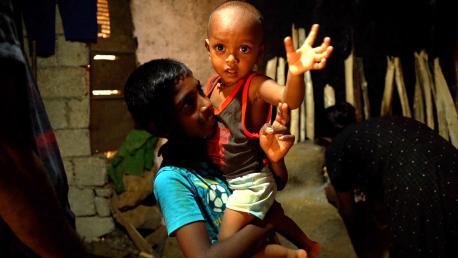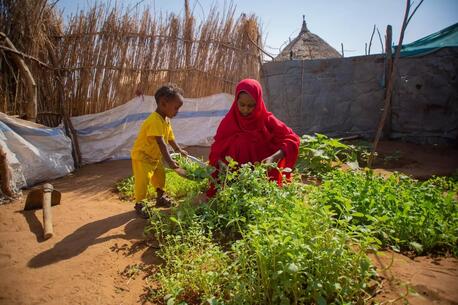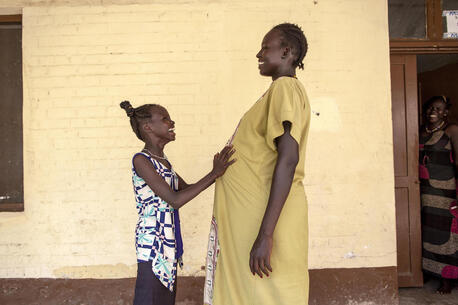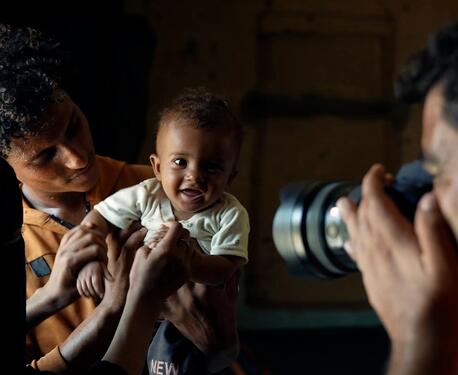
Improving Child Nutrition With Cash
UNICEF's Cash Plus program in Sri Lanka has been a game changer for Kamaleshwari and her family. A closer look at one of UNICEF's most impactful forms of relief.
Giving families purchasing power to address child malnutrition
The monthly payments might seem small: 6,750 rupees, or about $21. But they are making a huge difference for Kamaleshwari, 28, who lives in rural Dehiowita, Sri Lanka, 35 miles northeast of Colombo, with her husband Eloshiar and their two boys, Ariesh, 10, and Aswin, 18 months.
When an economic crisis triggered sky-high inflation and food and fuel shortages, the family suffered like so many others who live on meager wages earned picking tea.
The worst effects of the crisis have eased somewhat, but many vulnerable families are still struggling to pay for essentials. Malnutrition remains a potent threat to the youngest children, with many children suffering from wasting or stunting.
UNICEF has been responding to urgent needs by expanding some key programs alongside local partners. These efforts include providing cash assistance to families like Kamaleshwari's. Her household is one of 70,571 beneficiaries across six districts, and plans are underway to add 40,000 more.
Kamaleshwari shyly greets visiting staff members from UNICEF Sri Lanka and UNICEF USA near the back entrance to her home, a single-story rowhouse at the end of a dirt lane shaded by lush green foliage. Chickens strut about the yard, ignoring the dog napping in the shade. Up on a slope, a shed stands over a shared latrine. A large sack of sugar rests against corrugated metal siding.
Inside her home, Kamaleshwari points out grocery items she's been able to purchase for the first time in months like sausages, chickpeas, dried fish and yogurt. After months of making do with little more than rice for her boys, she says Ariesh and Aswin are back to eating regular, more balanced meals.
A package of interventions that includes information about healthy feeding practices
"The cash is part of a package of interventions," explains Bismarck Swangin, Chief of Communication, Advocacy and Partnerships for UNICEF Sri Lanka. "It comes with information — about infant and young child feeding practices, about breastfeeding and hygiene. It's advice on how to use what's available at local stores to meet children's nutritional needs."
UNICEF collaborates closely with district health authorities and community-based organizations to help identify eligible recipients and train frontline workers to ensure registration and implementation go smoothly. The idea is to prevent mothers from needing to travel long distances to get signed up, Swangin says.
Kamaleshwari shows visitors a record of her youngest child's growth since birth. A community health worker comes by regularly to do a nutritional screening, marking the boy's height and weight against a color-coded chart.
UNICEF helped Sri Lanka’s Ministry of Health develop the materials — including providing the paper to print them on, when supplies ran out due to budget cuts. Public health worker visits are a government-provided service in Sri Lanka, but caseloads are heavy, with each worker assigned to 350 or so children.
Aswin's chart shows that in the past two months, he has gained a little weight.
Smiling, Kamaleshwari says she is thinking differently about the future now. She hopes she can put some money aside to help pay for her kids' education.
There are more children in need, she adds. "If you can do this help for them too, we thank you."
Nearly one-third of Sri Lanka's population is food insecure, jeopardizing children's health and well-being. Learn more about what UNICEF is doing in Sri Lanka to help children and families in need.
Support UNICEF's mission. Donate today.


